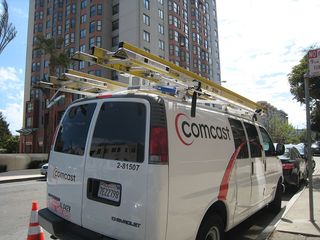Comcast gets ready to raise monthly data caps to 1TB
That means more streaming, Netflix fans

Comcast has decided to keep its data caps intact, but in lieu of removing them altogether, as the FCC (and broadband subscribers) would prefer, it’s tripling the amount of data allocated to subscribers to 1TB per month, the ISP announced this week.
The ISP first start imposing a limit on monthly data consumption in 2008. Comcast decided on 250GB per month, an amount it deemed at the time as “extremely large” and “much more” than what a typical residential customer would use on a monthly basis. The ISP pitched the data cap as a benefit to the majority of its subscribers—by curbing what it considered “excessive use,” Comcast said it could offer the vast majority of its customers a “high-quality service.”
Comcast kicked the 250GB data cap to the curb in 2012 and started trialing 300GB monthly limits in certain parts of the U.S. and on select plans. Effective June 1, that limit jumps to 1TB and will apply to all customers in trial markets, regardless of their speed tier. For the so-called “super users” who might go over the limit—less than 1 percent of Comcast’s subscribers, according to the ISP—Comcast will remove the data cap altogether for an additional $50 per month (up from $35 previously). Otherwise, going over the cap will cost $10 for every 50GB.
“A terabyte is an enormous amount of data. It’s far more than most of our customers will ever use in a month,” Comcast says. “Today, more than 99 percent of our customers do not come close to using a terabyte. Our typical customer uses only about 60GB of data in a month – that’s far less than a terabyte (in fact, 940GB less), or less than six percent of a terabyte.”
That might be true, but there have been reports of Comcast subscribers cancelling streaming services like Netflix and Hulu because of data caps. It’s not clear from Comcast’s numbers how many of its “typical customers” use far less data than allowed only because they’ve cancelled or avoided using online services that would put them over the limit.
Raising the cap to 1TB will certainly help matters, but as 4K video streaming and eventual 8K video streaming trickle into the mainstream, plus things like VR content and bigger game downloads, that 1TB data ceiling might not seem so high in the not-too-distant future.
It’s also worth mentioning that the FCC is opposed to data caps altogether. The government agency is putting together a proposal that would allow Charter Communications to proceed with its proposed acquisition of Time Warner Cable and Bright House Networks, but only if Comcast agrees not to impose data caps for at least seven years.
PC Gamer Newsletter
Sign up to get the best content of the week, and great gaming deals, as picked by the editors.
Paul has been playing PC games and raking his knuckles on computer hardware since the Commodore 64. He does not have any tattoos, but thinks it would be cool to get one that reads LOAD"*",8,1. In his off time, he rides motorcycles and wrestles alligators (only one of those is true).
Most Popular








